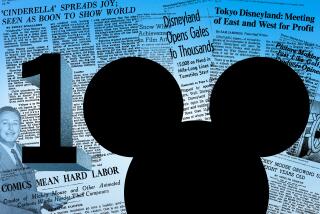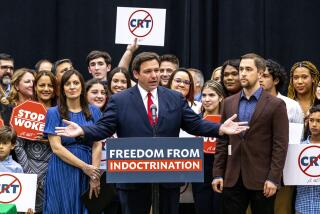How Disney used shell companies to start its Magic Kingdom

- Share via
Politicians and the global elite exposed in the so-called Panama Papers aren’t the only ones that set up shell companies to hide what they’re up to.
In fact, one classic example of how such companies are used comes from Burbank’s own Walt Disney Co.
In the mid-1960s, when the company was looking to buy tens of thousands of acres of land in Florida for its Disney World resort, the company made the purchases using several shell companies -- with names such as Latin-American Development and Management Corp., Tomahawk Properties and M.T. Lott Co. (Get it?)
The idea was that if property owners knew Disney was interested in their land, they might hold out for a far higher price, said David Koenig, the author of several books about Disney theme parks, including “Realityland,” which chronicles the creation of Disney World.
“There were dozens of landholders, and as soon as someone heard that Disney bought lot one, they knew the price on lots two through 50 would go through the roof,” Koenig said. “It had to appear as if it were just a coincidence that there were 10 different companies buying land in the same area.”
Beyond using shell companies, Disney took other steps to hide its identity. For instance, Disney attorney Bob Foster called himself Bob Price when he was scouting for land, according to a story posted on an official Disney Parks blog in 2013.
What’s more, instead of flying directly from Florida to Los Angeles, Foster would stop in St. Louis – resulting in rumors that McDonnell Aircraft, then based in that city, was the mystery buyer.
Heather Lowe, legal counsel for Washington, D.C., advocacy group Global Financial Integrity, said the Disney World example is often cited as a way that shell companies can be used for legitimate business purposes.
Still, it’s an argument she doesn’t accept. By hiding its identity, Lowe said Disney withheld information from land owners, potentially giving the company an unfair advantage in negotiations.
“What you’re saying is that one party should have more information in the transaction than the other – that the buyer should have more information than the seller,” she said. “That goes against the entire concept of an economically sound transaction.”
Twitter: @jrkoren
ALSO
The debate in California over how owners can use LLCs to obscure their identities
British prime minister says he bungled admission of investment revealed in ‘Panama Papers’
‘My God. We’ve done this’: Meet the reporters who probed the Panama Papers
More to Read
Inside the business of entertainment
The Wide Shot brings you news, analysis and insights on everything from streaming wars to production — and what it all means for the future.
You may occasionally receive promotional content from the Los Angeles Times.











